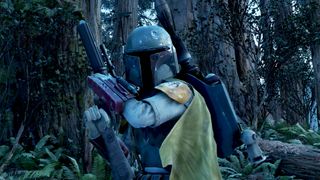
THE LOWS
Andy Kelly: Star woes
I reviewed Star Wars Battlefront, and while I had some fun with it, it was largely a shallow, forgettable experience. I haven’t played it since, which says it all, really. My main criticism was that, while it captured the look and feel of the original trilogy brilliantly, the shooter underneath all the cinematic flair was about as deep as a particularly shallow puddle. And, as it turns out, it was a perfectly valid criticism. An EA exec admitted that the game was developed to be accessible and playable by people of all ages, which explains why it feels so lightweight.
I know why they designed it this way. Star Wars is the biggest thing in the world right now, and releasing a super hardcore shooter would limit their audience. But it’s a wasted opportunity, and I’m disappointed it’s not the rich, deep Star Wars-flavoured competitive shooter I dreamed it would be. A free DLC, based on The Force Awakens’ desert planet Jakku, was released this week, but two new maps and a new mode (that I hear is very similar to Supremacy in the base game) isn’t enough to make me want to reinstall it. Maybe I’ll come back if they release a DLC that adds Jar Jar Binks, the best Star Wars character, to the hero roster.
Angus Morrison: Cyberpunked
In my new role as lead PCG rumourmonger, this week I happened upon a tasty but suspect morsel of information. The German Gamesreactor site was reporting that CD Projekt might be planning to spring Cyberpunk 2077 on us late in 2016—61 years ahead of schedule.
Of course this felt doubtful. CD Projekt staff have stated many times that nary a word about Cyberpunk will pass their bionic lips until The Witcher 3 is over and done with, and we’re still due a massive expansion. Add to this the fact that the new information was from an anonymous source and it carries only a tad more weight than my assertion that Half-Life 3 will release on February 30, 12 BC. Still, a part of me wanted to believe.
Now, CD Projekt has officialy said it’s all about the Witcher, baby. I’m being flippant to conceal the fact that I am crushed, although, if you pay close attention to CEO Adam Kiciński’s interview (as translated by NeoGAF), he doesn’t explicitly kill the rumour...
I am a naïve child.
PC Gamer Newsletter
Sign up to get the best content of the week, and great gaming deals, as picked by the editors.

Tom Marks: Overwatching from the sidelines
I know, I know. Most people can’t play Overwatch at all yet, but it’s been my primary game since I got into the closed beta. Now that has shut down until an unannounced date in January, and I’m feeling the hurt. I was enjoying Overwatch immensely, and it’s not a common situation for a game to simply become unavailable for a month. Imagine, if you will, if your most-played game suddenly blinked out of existence for a month. It would suck right?
Still, I’m trying to take this break as an opportunity to pick up other games I have neglected. I still need to dive into the Enhanced Edition of Divinity: Original Sin, my time with XCOM 2 has given me the strategy bug again, and I haven’t managed to even touch Rainbow Six: Siege yet. So although my current obsession is gone, it’s not like I lack for potential amusement. It’s a seriously wonderful time to be a PC gamer, I’m sure I’ll survive.
Wes Fenlon: Will SteamVR be ready?
Valve’s hardware ambitions in 2015 have been, I think it’s fair to say, overly ambitious. I’m glad to see Valve making things aside from just money again. It’s been awhile. But the timelines they set out in the spring, when they announced the Steam Controller, Steam Link and SteamVR for release at the end of this year, were definitely not realistic. The controller and Link arrived, but with serious experience issues and software and firmware development left to do. SteamVR’s release has now been pushed back to April 2016, with some headsets going out to developers before that. Based on the Link and controller, I’m skeptical it’ll be a smooth launch. I’m really, really excited for SteamVR—the hardware is genuinely incredible—but I’m worried about Valve alienating a general audience with a rough user experience out of the gate. Of course it’ll get better. But will it get better fast enough?
With as many things as Valve is doing, it’s still easy to forget how small a company they are, relative to the Googles, Apples and Microsofts of the tech world. And only a small portion of those people are experienced hardware engineers. I just hope they have the manpower to harness their vaulting ambition into a successful VR launch.

Samuel Roberts: Fantasy lost
Final Fantasy VI is coming to PC for the first time ever next week, which is cool. I like that Square Enix has gradually been building up to a complete Final Fantasy back catalogue on Steam, and with SteamDB listings for Final Fantasy X and X-2 discovered this week, it’s possible we’ll have every one of them released on PC eventually.
The only downside is, it’s a mobile port of the SNES original, rather than the more faithful Game Boy Advance or PlayStation version, and that means redrawn sprites and jarringly modern UI. It would’ve been nice to have the option for the original sprites. Or am I being too pedantic?
James Davenport: Broken Gauge
During my brief stint in education, I read about a term coined by scholar Dan Lortie called “the apprenticeship of observation.” It states that because most of us are students—a teacher’s subjects— for a good portion of our lives, we’re inclined to believe we understand how teaching works. And sure, you can watch what a teacher does and imitate, more so if you already know everything there is about WWII. But you’d be missing out on everything you don’t see a teacher do: discipline, curriculum, scheduling, crying, budgeting, and on, and on. I didn’t last long as a teacher for a reason.
I’m seeing a similar, more toxic apprenticeship form around game development, specifically Double Fine. It’s incredibly rare for a developer to offer a genuine inside look at how games are made. Double Fine documented the entire process for Broken Age. The financial troubles ballooned by creative idealism are there, the cancelled game that caved in the studio’s operating budget and forced Schafer to let go of some long term employees is there, the anguish and fear and indecision and joy on every employee’s face is there. It’s a significantly more complete picture of game development than any mid to large developer has ever put on display. Now that we’ve been given an inside look, a select few have decided that they understand how Double Fine operates, taking up internet-comment-arms against anything and everything they do because Broken Age took a long time and Spacebase DF-9 development was halted.
This week Schafer spoke to us about the difficulties of game development a few days back, summing it up as the “...complexity of software engineering multiplied by the subjectivity of art and entertainment." I’m not saying everyone needs to be in love with Double Fine, or that skepticism and criticism aren’t important (they’re vital). What’s important is that we all take a step back and admire for one second that a goddamn virtual world can even exist. Beyond that, worlds like Psychonauts or Broken Age that even have the possibility to exist in an industry in a constant battle with itself between the creative integrity of a game over its viability as a product. And most importantly, that not many of us really understand the difficulties of game development, let alone Double Fine’s specific hurdles.
Hey folks, beloved mascot Coconut Monkey here representing the collective PC Gamer editorial team, who worked together to write this article! PC Gamer is the global authority on PC games—starting in 1993 with the magazine, and then in 2010 with this website you're currently reading. We have writers across the US, UK and Australia, who you can read about here.

